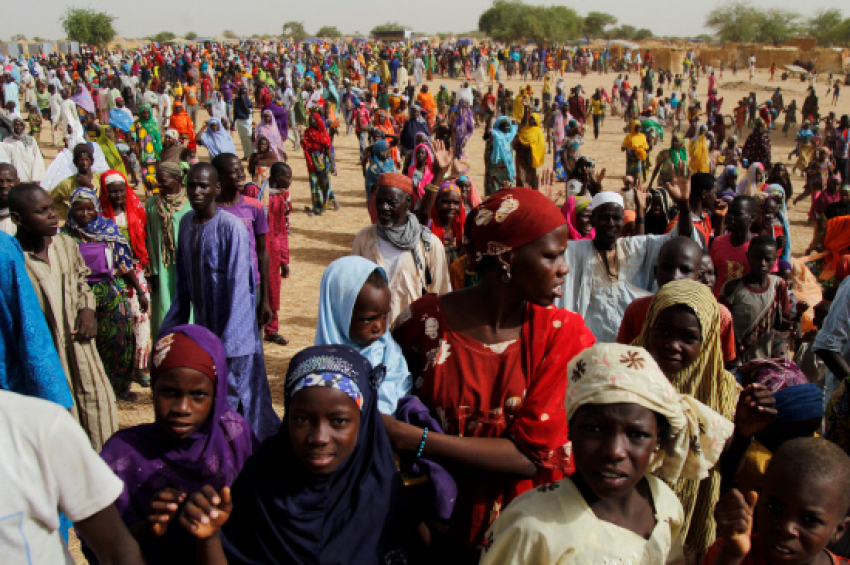Christian Aid Groups Say Trump Lowering Refugee Ceiling to 45,000 Is 'Absurd'

Christian leaders and humanitarian aid organization heads have spoken out against the Trump administration's announcement that it will allow no more than 45,000 refugees to resettle in the United States in the next fiscal year.
As the world suffers the worst migration crisis since World War II, the Trump administration has again lowered the number of refugees that will be admitted in the U.S. With the 2017 fiscal year coming to a close this weekend, the Trump administration informed Congress that it is capping refugee resettlement for fiscal year 2018 at 45,000.
A senior administration official cited "security and safety of the American people" as the "chief concern."
"America has big blessings from God, and we should give big blessings to refugees in need," Leith Anderson, president of the National Association of Evangelicals, said in a statement shared with The Christian Post. "We can't take all but we should be a lead nation on doing our share."
The cap of 45,000 is less than half of the 110,000-refugee ceiling former President Barack Obama set for fiscal year 2017 and 5,000 less than the 50,000-refugee ceiling that Trump set earlier this year in an executive order announcing his travel ban. It is also the lowest ceiling set by any White House since the Refugee Act was passed in 1980.
Erol Kekic, executive director of the Church World Service Immigration and Refugee Program, one of nine organizations that receives funding from the State Department to resettle refugees in the U.S., said in a statement that the 45,000 limit is "absurdly low" considering that it comes against "the bleak backdrop of a global migrant crisis" that has now displaced over 66 million people from their homes.
"The argument that the Department of Homeland Security lacks capacity to interview refugees is absurd, especially as they recently announced that they have the resources to spy on immigrants, including naturalized U.S. Citizens," Kekic argued. "President Trump continues to defy hard facts, bipartisan support, and the overwhelming will of the American people who stand for welcome."
Bishop Michael Rinehart, chairman of the Board for Lutheran Immigration and Refugee Service and head of the Evangelical Lutheran Church in America's Texas-Louisiana Gulf Coast Synod, said in a statement shared with CP that the cut to the U.S. refugee ceiling comes at a "a time when the world needs us desperately."
"[I]t seems we are shutting the door on the Statue of Liberty," Rinehart said. "I pray that America does not lose its heart and soul."
Although Trump set a ceiling of 50,000 refugees for fiscal year 2017, State Department data indicates that over 53,000 refugees were actually resettled into the U.S. in fiscal year 2017, including 32,000 resettled before the end of the Obama administration, according to CNN.
Even though 45,000 would be the lowest U.S. refugee ceiling in a fiscal year set by a president since 1980, there have been years since then when less than 45,000 refugees have been resettled into the U.S., especially in the aftermath of Sept. 11, 2001.
According to the Washington, D.C.-based nonprofit Center for Immigration Studies, a total of 28,286 refugees were resettled in 2002, and there were only 41,223 admissions in fiscal year 2006.
Jenny Yang, vice president of advocacy and policy at the evangelical resettlement agency World Relief, told CP earlier this month that her organization and others refugee advocates were pushing the administration to set the refugee resettlement cap at 75,000 or greater for fiscal year 2017.
In 2017, World Relief has been forced to close five offices and lay off over 140 employees because of Trump's drastic cut in refugee admissions earlier this year. Yang told CP in an email Thursday that World Relief doesn't anticipate closing any more offices because of the latest reduction to the refugee ceiling but imagines that the organization will again have to evaluate staffing needs.
"Such a severely limited refugee ceiling for FY18 will have ripple effects around the world and keep refugees who have nowhere to go in constant risk," World Relief CEO Tim Breene said in a statement. "This will affect those desperately fleeing persecution and violence, women and children who have experienced unimaginable atrocity, and our allies who have supported our armed forces and foreign policy agenda."
Although Trump and Vice President Mike Pence have voiced their willingness to defend persecuted Christians around the world, LIRS President and CEO Linda Hartke said in a statement shared with CP that many churches and communities are "heartsick at the administration's callous and tragic decision to deny welcome to refugees most in need."
"We are not afraid of our new neighbors and are not fooled by cruel and false claims that refugees are a threat to our safety," Hartke said. "The American legacy of welcoming refugees has made us stronger and better, and the government's own research proves that refugees bring economic benefit to our country through their hard work."



























